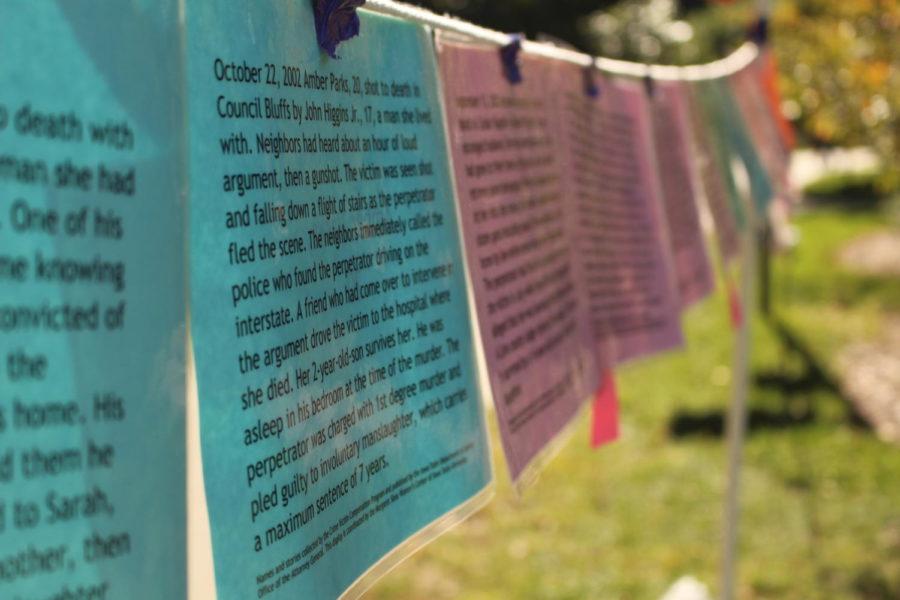Editorial: Watch for signs of domestic violence
The back of each card displayed the story of each victim and their story. ACCESS, Student Alliance and The Margaret Sloss Women’s center held their annual Lives on the Line: Stories of Iowans Lost to Domestic Violence. The display showed color coded aged victims and their stories. Red tags on the poster indicated a male victim, and a blue tag indicated a victim from Story County. The timeline of stories ranged from reports in 1995 to September 2016.
October 8, 2018
There’s a common, yet dangerous, question often extended to victims of domestic violence: Why don’t you just leave?
And the answer is complex.
For some victims, they may not even realize they are being abused or that their relationship is unhealthy. Others may understand the abuse but cannot leave because they are scared of being outed by their partner or ashamed of the stigma that comes with being abused.
There may be cultural and religious reasons that keep a victim with their abusive partner out of fear of not wanting to shame one’s family. In some cases, they just may not have enough money to leave.
One of the biggest barriers? Love.
“Abusive people can often be charming, especially at the beginning of a relationship, and the victim may hope that their partner will go back to being that person. They may only want the violence to stop, not for the relationship to end entirely,” according to the National Domestic Violence Hotline.
In fact, nearly 20 people per minute are physically abused by an intimate partner in the United States, according to the National Coalition Against Domestic Violence. This equates to 10 million women and men in just one year.
Yet, despite this issue being pervasive in our culture — intimate partner violence accounts for 15 percent of all violent crime — many are uneducated about domestic violence and the conversation is often forced to the sideline at both a local and national level.
This is partly because many don’t know the signs to look out for, both in their own relationship and in their loved ones. Domestic violence takes form in not only physical abuse, but also emotional, sexual and financial abuse.
In recognition of Domestic Violence Awareness Month, here are some warning signs of abusive partners, as listed by the National Domestic Violence Hotline:
-
Tells you that you can never do anything right
-
Shows extreme jealousy of your friends and time spent away
-
Keeps you or discourages you from seeing friends or family members
-
Insults, demeans or shames you with put-downs
-
Prevents you from working or attending school
-
Destroys your property or threatens to hurt or kill your pets
-
Intimidates you with guns, knives or other weapons
-
Pressures you to have sex when you don’t want to or do things sexually you’re not comfortable with
-
Pressures you to use drugs or alcohol
If you or someone you know feel as if you may be in an abusive relationship, resources include thehotline.org and loveisrespect.org.







